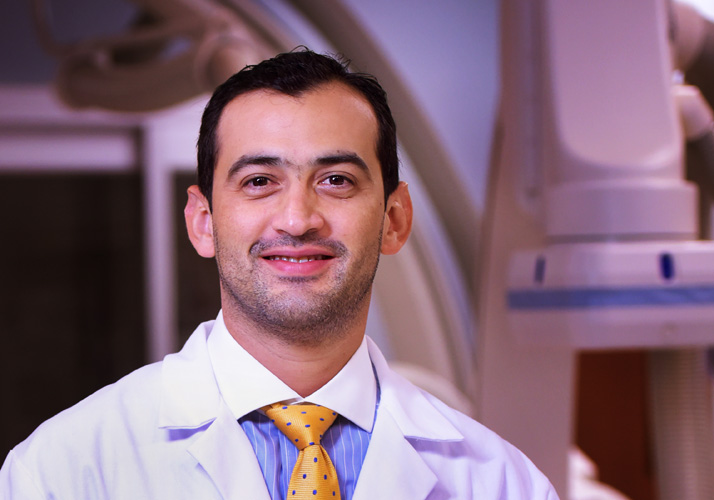
One in every three deaths in the U.S. is caused by cardiovascular problems, according to the National Institutes of Health.
That’s more than 800,000 lost lives each year – more than are lost to all forms of cancer and chronic lower respiratory diseases combined.
The statistic is grim, but, happily for patients here, Cleveland Clinic Indian River Hospital has just strengthened its heart team. Dr. Carlos Gonzalez, a newly arrived interventional cardiologist, will be working at the hospital’s Welsh Heart Center.
He says he is excited to join the heart team here and briefly explains what an interventional cardiologist is and does.
“After finishing regular training in cardiology and cardiovascular disease,” Gonzalez says, “it takes one or sometimes two years of extra training” to learn the catheter-based therapies which “can open blocked arteries in the heart, as learning to treat patients who present in the ER in an acute manner, like someone having a heart attack.”
But that’s just the tip of the iceberg.
The American Medical Association elaborates, defining interventional cardiology as “an area of medicine within the subspecialty of cardiology that uses specialized imaging and other diagnostic techniques to evaluate blood flow and pressure in the coronary arteries and chambers of the heart, as well as technical procedures and medications to treat abnormalities that impair the function of the cardiovascular system.”
“At the same time,” Gonzales continues, “you could work in the legs or with structural heart problems and congenital heart disease to fix problems that patients were born with.”
It’s those structural and congenital heart problems, as well as heart valve problems and treatments, that seem to spark Gonzalez’s keenest interest.
According to the University of Chicago’s Department of Medicine, “valve and structural heart disease is an umbrella term that encompasses the full scope of conditions caused by defects or abnormalities in the heart’s valves, walls and/or muscle. Heart valve conditions are either congenital (present at birth) or can form later in life due to aging, infection or correlated underlying conditions.”
But diagnosing the precise cause of such problems can be tricky.
The University of Chicago also says “symptoms and severity of structural heart disease will vary from patient to patient, but the most common symptoms are: chest pain or tightening; fatigue; high blood pressure; kidney dysfunction; leg cramping; migraines; shortness of breath/difficulty exercising, and stroke.”
Yale University’s School of Medicine chimes in with a nod to Gonzalez’s catheter-based approach, saying: “While open heart surgery may still be the best solution in some cases, minimally invasive catheter-based therapies have made care easier on patients, with fewer complications and quicker recoveries.”
Quicker recoveries may be something of an understatement, depending on the procedure.
Gonzalez says a patient who comes in for a trans-aortic valve replacement (TAVR) procedure might have his or her procedure in the morning and be up and walking in the afternoon and go home the very next day. And Gonzalez can’t resist adding, “that’s actually unthinkable for an open-heart surgery.”
Gonzalez goes on to extol the benefits of Cleveland Clinic’s systemwide ‘Heart Team Approach.’
Working with specialists here, in Weston, in Tradition and throughout the Cleveland Clinic network, Gonzalez says “we’re talking about a group of maybe 10 or 12 experts in heart problems,” working together on a single case to devise the best possible plan for any procedure. He calls it “a really exciting time, integrating with the whole community network,” and collaborating with all the related specialists in the Cleveland Clinic system.
In addition, he says, “we have a big group of excellent cardiologists in the Vero community who are independent. They’re private cardiologists,” not employed by the hospital, but they often refer patients to Cleveland Clinic and work together with the Welsh Heart Center team in the patients’ best interest for the best possible outcome.
Gonzalez, who was trained at NYU and the famed Mount Sinai system, says he wholeheartedly embraces this team approach. “I think there are exciting times coming and I think something that was already very good, is going to be even better in the future.”
In closing, Gonzalez notes the patients he sees here typically come by way of referrals from primary care physicians or other cardiologists, inside or outside the hospital, who usually order tests and imaging before sending the patient to him.
Dr. Carlos Gonzalez is an interventional cardiologist at the Cleveland Clinic Indian River Hospital and the Welsh Heart Center.




Comments